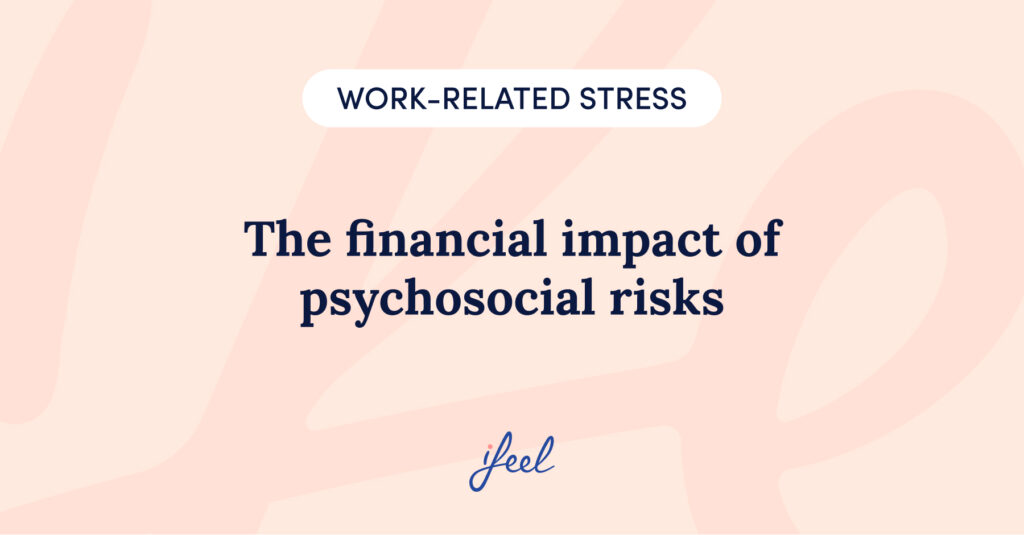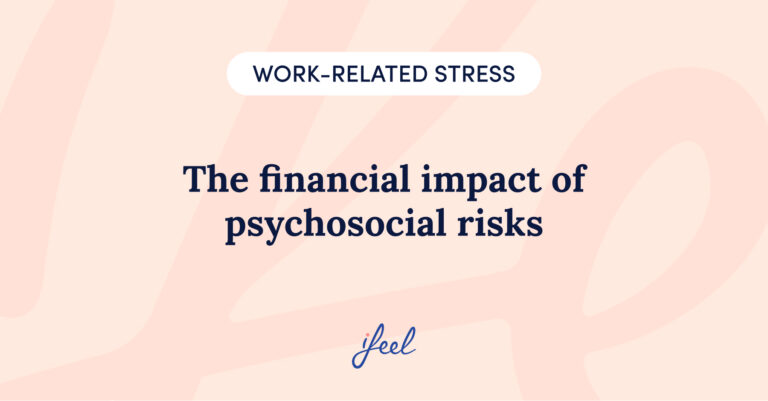Psychosocial risks represent a critical challenge for modern organisations. Factors such as work-related stress, burnout and imbalance between personal and professional life not only seriously affect employees’ mental health but also have a direct impact on productivity and operational costs.
Therefore ignoring these risks is not an option for companies that want to thrive in an increasingly competitive world. The reality is that psychosocial risks can trigger increased absenteeism, staff turnover and decreased engagement, affecting both financial results and organisational culture.
In this context, ifeel positions itself as a strategic solution that enables organisations to effectively address these risks by combining technology, data analysis and clinical expertise.
Discover how you can prevent psychosocial risks at work and save costs by downloading our guide here.
What are psychosocial risks and why are they important?
Psychosocial risks are factors related to the organisation, content and conditions of work that can negatively affect employees’ mental and physical health. The most common include:
- Work-related stress: excessive workload or tight deadlines.
- Burnout: emotional and physical exhaustion due to prolonged stress.
- Work-life imbalance: lack of flexibility to meet personal needs.
- Workplace harassment: hostile behaviours in the work environment.
These risks not only negatively impact individual well-being but also have significant consequences for companies, such as increased absenteeism, staff turnover, and a notable reduction in productivity, all stemming from associated mental health problems.
These consequences translate into high business costs: according to the World Health Organization (WHO), mental health disorders cause global economic losses exceeding $1 trillion annually due to decreased productivity.
Financial impact of psychosocial risks
Thus, we can affirm that the financial impact of psychosocial risks on companies is significant and often underestimated. This is a serious mistake, as estimates show that a high-risk employee can generate costs ranging between €15,000 and €50,000 per year. These costs include:
| Type of cost | Description |
|---|---|
| Direct costs | Long-term sick leave and talent replacement processes. |
| Indirect costs | Decreased productivity and team tensions. |
| Opportunity costs | Potential losses due to delayed projects or reputational damage. |
For this reason, implementing prevention strategies not only significantly reduces costs associated with absenteeism, staff turnover and productivity loss but also has a transformative impact on employee engagement and satisfaction.
Proactively preventing and addressing psychosocial risks creates a healthier work environment where employees feel valued, supported and motivated to give their best.
Moreover, these strategies strengthen the bond between teams and the organisation, fostering a culture of trust and well-being that improves not only individual performance but also collective results. Clearly, in a competitive labour market, prioritising prevention of these risks is not just a responsible decision but a strategic advantage that positions companies as attractive and sustainable employers.
Strategies to prevent the financial impact of psychosocial risks
Preventing the financial impact of psychosocial risks requires a proactive and structured approach. Here are some key strategies:
Identify psychosocial risks:
Use tools such as internal surveys and data analysis to assess stress levels, absenteeism and turnover in your organisation. Early identification is essential to design effective interventions.
Implement prevention programmes:
Design initiatives that address risks before they become serious problems. This includes emotional management workshops, mindfulness programmes and training in empathetic leadership.
ifeel uses a data- and technology-based approach to identify and address psychosocial risks in real time. Through its platform, companies can assess the actual risk level by measuring indicators such as absenteeism, turnover and sick leave.
Personalise solutions:
Not all employees face the same challenges. Offer resources tailored to different risk levels, from psychoeducational content for mild cases to individual therapy for critical situations.
To this end, ifeel designs personalised plans, adapting solutions to each risk level:
| Risk level | Characteristics | ifeel solution |
|---|---|---|
| Low | Occasional stress, mild issues | Psychoeducational content and workshops. |
| Medium | Recurring problems, moderate impact | Chat therapy and continuous follow-up. |
| High | Crisis, prolonged absenteeism | 1:1 online therapy with immediate intervention. |
Monitor and measure impact:
Regularly evaluate the success of implemented strategies. Use indicators such as reduced absenteeism, increased engagement and financial savings to adjust and optimise interventions.

Benefits of a prevention strategy with ifeel
Implementing a psychosocial risk prevention strategy with ifeel generates tangible benefits both clinically and financially:
Clinical impact:
- Risk level reduction: significantly decreases medium and high-risk cases.
- Improved overall wellbeing: increases employee motivation and engagement.
Financial impact:
- Labour cost savings: absenteeism and turnover reduction between 15% and 25%.
- Higher ROI: every euro invested in prevention generates a positive return.
Competitive advantage:
- Talent attraction and retention: companies prioritising wellbeing are seen as responsible employers.
- Improved corporate reputation: promotes a positive and sustainable image.
Success stories: how ifeel transforms organisations
A notable example is a pharmaceutical company that implemented ifeel’s solutions and achieved:
Reduced mental health-related absenteeism by 25%.
Saved €4.65 million in the first year and projected €13.96 million in three years.
Increased employee engagement by 30% and productivity by 20%.
To find out more, download our Pharmaceutical industry case study here.
Discover how ifeel can transform your organisation
Preventing psychosocial risks is not just a matter of social responsibility but a strategic decision that drives business success. With ifeel, you can turn mental health into a competitive advantage, optimising costs and improving productivity.
Download our exclusive document now and take the first step towards a healthier, more sustainable organisational culture.







